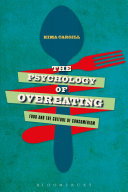

Most ebook files are in PDF format, so you can easily read them using various software such as Foxit Reader or directly on the Google Chrome browser.
Some ebook files are released by publishers in other formats such as .awz, .mobi, .epub, .fb2, etc. You may need to install specific software to read these formats on mobile/PC, such as Calibre.
Please read the tutorial at this link: https://ebookbell.com/faq
We offer FREE conversion to the popular formats you request; however, this may take some time. Therefore, right after payment, please email us, and we will try to provide the service as quickly as possible.
For some exceptional file formats or broken links (if any), please refrain from opening any disputes. Instead, email us first, and we will try to assist within a maximum of 6 hours.
EbookBell Team

0.0
0 reviewsDrawing on empirical research, clinical case material and vivid examples from modern culture, The Psychology of Overeating demonstrates that overeating must be understood as part of the wider cultural problem of consumption and materialism. Highlighting modern society's pathological need to consume, Kima Cargill explores how our limitless consumer culture offers an endless array of delicious food as well as easy money whilst obscuring the long-term effects of overconsumption.
The book investigates how developments in food science, branding and marketing have transformed Western diets and how the food industry employs psychology to trick us into eating more and more – and why we let them. Drawing striking parallels between 'Big Food' and 'Big Pharma', Cargill shows how both industries use similar tactics to manufacture desire, resist regulation and convince us that the solution to overconsumption is further consumption. Real-life examples illustrate how loneliness, depression and lack of purpose help to drive consumption, and how this is attributed to individual failure rather than wider culture.
The first book to introduce a clinical and existential psychology perspective into the field of food studies, Cargill's interdisciplinary approach bridges the gulf between theory and practice. Key reading for students and researchers in food studies, psychology, health and nutrition and anyone wishing to learn more about the relationship between food and consumption.